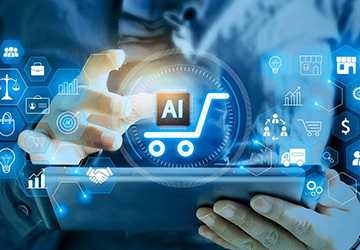Latest Developments and Applications of AI
Imagine a place where your doctor can predict your illness before you even feel sick, where your car drives you to work, and where your shopping experience is tailored just for you. Artificial Intelligence (AI) has transitioned from science fiction to a tangible force transforming various aspects of our lives.

Since its inception, AI has come a long way, from simple machine learning models to complex systems capable of performing tasks that once required human intelligence. The relevance of artificial intelligence in modern society cannot be emphasized, as it drives innovation and efficiency across numerous fields. This article looks into the most recent advances in real-world AI applications and how they have been applied in various industries.
AI in Healthcare
Artificial intelligence (AI) has made tremendous advances in health, redefining how doctors diagnose, treat, and manage patients. By integrating AI technology into several health domains, we can obtain more accurate diagnoses, individualized treatments, and better patient outcomes.
Medical Imaging
AI in healthcare means that their systems can now evaluate medical pictures like X-rays and MRIs more accurately and quickly than human radiologists. This early detection capability can lead to timely treatments and better patient outcomes. AI in medical imaging increases diagnosis accuracy and minimizes the strain on healthcare personnel, freeing them to focus on more challenging patients.
Take breast cancer detection, for example. AI systems have been shown to detect cancerous lesions in mammograms with accuracy comparable to that of experienced radiologists. Patients can get faster and more reliable diagnostics even in understaffed or high-volume settings.
Personalized Medicine
AI helps tailor treatments to individual patients by analyzing genetic information and medical histories. This approach not only makes treatments more effective but also minimizes side effects. Personalized medicine is a significant step towards more targeted healthcare, improving patient outcomes and satisfaction.
Consider how AI in healthcare can analyze a vast database of patient histories to predict how a new drug will affect different demographics. This predictive power means fewer adverse reactions and more effective treatments. It's like having a medical crystal ball.
AI in Transportation
Travel is another real-world AI application. Artificial intelligence (AI) makes travel safer, more efficient, and more autonomous. AI is laying the groundwork for more accessible and smooth transportation in the future, from self-driving automobiles to sophisticated traffic control systems.
Self-Driving Cars
AI is also influencing transportation, particularly with the development of self-driving cars. These vehicles use AI to circumnavigate roads, avoid obstacles, and keep passengers safe. Beyond vehicles, AI is also optimizing city traffic management systems, reducing congestion and improving public transportation. Integrating AI in transportation promises to reduce traffic accidents, improve travel efficiency, and decrease urban congestion, making cities more intelligent and livable.
Real-world AI applications by Tesla and Waymo include the development of self-driving vehicles capable of handling most driving situations. This technology promises to make roads safer and offers mobility solutions for those who can't drive, like the elderly or disabled.
Logistics
AI optimizes delivery routes, thus reducing fuel consumption and ensuring faster deliveries. Additionally, AI-powered drones are being tested for delivering various goods, including medical supplies and food. These advancements streamline logistics, making supply chains more efficient and responsive.
Think about how companies like Amazon are experimenting with drone deliveries. Using real-world AI applications to determine the fastest, most efficient delivery routes, these drones can get packages to customers in record time, reducing the need for human drivers and reducing traffic.
AI in Finance
Artificial intelligence also significantly boosts the finance sector, thanks to its better security features and improved client relations. By utilizing AI technologies, financial institutions may provide more dependable services and better safeguard their customers from fraud.
Fraud Detection
In banking, artificial intelligence identifies fraud and provides customer support. Artificial intelligence technologies can detect and prevent fraudulent activity by examining real-time transaction patterns. This capability enhances security and protects financial institutions and their customers from fraud.
For instance, when you make a purchase that deviates from your usual spending habits, using algorithms and AI applications in real life can flag it as suspicious. This immediate detection helps banks take quick action to prevent potential fraud, saving millions of dollars annually.
Customer Service
AI-powered chatbots provide 24/7 customer support, handling inquiries quickly and accurately. By leveraging real-world AI applications, financial institutions can offer improved customer experiences and build trust and efficiency in their operations.

Chatbots like Bank of America's Erica are becoming more common. These virtual assistants help customers manage their accounts, answer questions, and provide financial advice. They reduce wait times and provide consistent, reliable service.
AI in Retail
The retail industry is experiencing a revolution with the help of AI, which is enhancing the overall shopping experience and optimizing inventory management. By analyzing customer data and automating stock processes, AI ensures that online and in-store shopping are more personalized and efficient.
Personalized Shopping
AI real-life applications are also transforming the retail experience through personalized shopping. Online retailers use AI to analyze customer behaviour and preferences, offering tailored product recommendations. AI helps manage inventory in physical stores by alerting staff when items run low and even restocking shelves with AI-powered robots.
Consider how Netflix and Amazon use AI to propose movies and items based on your viewing and purchasing habits. This tailored strategy improves the customer experience and increases revenue by displaying things customers are more inclined to buy.
Inventory Management
Smart shelves can alert staff when items are running low, and AI-powered robots can restock shelves, ensuring products are always available for customers. These innovations help retailers maintain optimal inventory levels and enhance the shopping experience.
Walmart, for example, uses AI to track inventory in real-time, predicting which products need restocking before they run out. This efficiency keeps shelves stocked, reduces waste, and improves supply chain management.
AI in Entertainment
AI is opening up new creative possibilities while improving the entertainment industry's interactive and pleasurable aspects, from producing unique music and scripts to suggesting content that aligns with personal inclinations.
Content Recommendations
Streaming services like Netflix and Spotify use artificial intelligence to recommend shows, movies, and music that suit our tastes. Thanks to continuous improvements in AI algorithms, these recommendations are getting better.
The algorithms analyze what you've watched or listened to and suggest new content that fits your tastes; this keeps users engaged and helps them discover new favourites, making the user experience more enjoyable.
Content Creation
Real-world AI applications also extend to content creation. The creative possibilities are expanding from AI-generated music to TV show scripts. Even video games leverage AI to create more immersive and responsive experiences for players.
Take the example of AI-generated music. Platforms like AIVA compose original music pieces in films, video games, and advertisements. This technology allows for unique and tailored compositions, pushing the boundaries of creativity.
Conclusion
AI is changing various sectors, offering new possibilities and improving efficiency while reducing costs. From healthcare to retail, the applications of AI are numerous and growing. While there are challenges to address, the potential benefits are enormous. As we continue to explore the capabilities of AI applications in real life, it's essential to stay informed and consider the broader implications of these technologies. AI is here to stay, and its impact will only grow in the coming years.